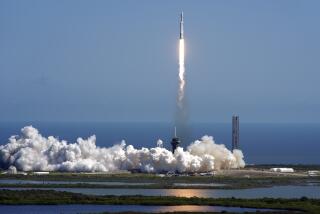Global Weather Problems Delay Launch of Shuttle Science Mission
- Share via
KENNEDY SPACE CENTER, Fla. — Bad weather around the world Sunday delayed the launch of the space shuttle Endeavour and its mission to carry aloft the world’s first commercial space laboratory and to retrieve a European science satellite.
Officials of the National Aeronautics and Space Administration said they will try again today, beginning at 6:07 a.m. PDT. If Endeavour does not get off the ground then, the launch will be postponed for an additional 48 hours.
Launch director Bob Sieck announced that Sunday’s liftoff was scrubbed at 7:43 a.m. PDT, more than an hour past the scheduled launch time for the shuttle fleet’s 56th mission.
The move came in the last 10 seconds of a 72-minute launch window that would have allowed Endeavour to rendezvous with the European satellite.
The skies over the shuttle launch complex were clear as the launch deadline approached. But five miles away, thick, low clouds marred visibility at the Kennedy Space Center’s emergency landing runway, where the shuttle would have to return if an engine failed in the first moments of flight.
Clouds also blocked the view at an emergency landing site in Banjul, Gambia, and crosswinds at two other landing sites--Ben Guerir Air Base in Morocco and Moron Air Base in Spain--exceeded NASA safety standards.
Moreover, an Air Force reconnaissance plane reported shortly before the deadline that an unidentified cargo ship had wandered into waters off the Florida coast where the shuttle jettisons its expended rocket boosters.
After a warning from the Coast Guard, the ship left the danger zone minutes before the launch window closed.
The six-member crew clambered out of the shuttle’s main hatch shortly before 9 a.m. PDT, and workers began draining the shuttle’s external fuel tank of more than 500,000 gallons of liquid hydrogen and oxygen in order to preserve the super-cold and highly perishable fuel.
NASA planned to refill the tanks beginning late Sunday night.
Had it gone as scheduled, the launch would have marked the 40th birthday of Endeavour’s pilot, Air Force Col. Brian Duffy. In a reference to the event, Sieck early in the day told Duffy: “We’re still hopeful the weather will cooperate so we can go ahead and light the big candle here.”
Endeavour, which flew its first mission last year, originally was scheduled to begin its fourth flight on June 3. However, technicians discovered a faulty spring in a fuel pump in the shuttle’s main engine, and the engine had to be replaced.
If the launch goes ahead today, it would begin a chase that finishes with the shuttle and the European satellite just a few dozen feet apart, circling Earth at 17,500 m.p.h.
The satellite, devoted largely to research involving industrial materials, life science and radiobiology, was launched last summer aboard the shuttle Atlantis. It was designed to be retrieved by the shuttle’s mechanical arm.
Endeavour is also scheduled to take the world’s first commercial space laboratory into orbit. Built for $200 million by SPACEHAB Inc. of Arlington, Va., the facility will carry 22 scientific experiments.
Twenty-one were developed and paid for by NASA, either directly or through the agency’s Centers for the Commercial Development of Space. The other experiment is sponsored by the European Space Agency.
Eventually, SPACEHAB plans to lease space in the laboratory to commercial concerns. The company, whose chairman is former NASA Administrator James Beggs, has a $184-million contract to fly NASA experiments during the laboratory’s first six flights.
More to Read
Sign up for Essential California
The most important California stories and recommendations in your inbox every morning.
You may occasionally receive promotional content from the Los Angeles Times.













